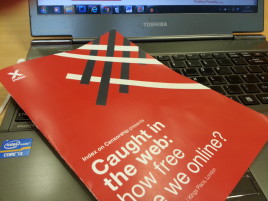In a week that saw deeply worrying revelations about the way big data from internet companies is being mined by US and British intelligence agencies, Index on Censorship held a meeting to ask, how free are we on the web?
Pod Academy attended the discussion and recorded some of the contributions (Here: Index discussion June 2013 ). It was chaired by David Aaronovitch
Cory Doctorow got the ball rolling by arguing that though there are very real dangers to freedom, there is another, more hopeful aspect to the internet – that new forms of online activism (often dismissively called ‘clicktivism’) are enabling formerly disenfranchised citizens to get involved in campaigning. However, in the later discussion he explored the danger of ‘accountability through algorithms’ – how algorithms are being used to unlock big data, and how they are necessarily a very blunt instrument when it comes to identifying terrorists. In his words, ‘it is like trying to find a pixel on your computer screen with a hotdog….you’ll get the pixel, and much else besides.”
Investigative journalist and writer, Heather Brook, had been looking into MPs’ expenses for 5 years before an insider in the House of Commons finally sold the database to the Telegraph, it was then, she said, she realised the power of the digital revolution. She pointed out that we are currently in a period of changeover of regulation from the analogue to the digital age, and that what we come up with must recognise that free speech itself is not a threat to freedom, rather it is the concentration of power.
Paul Tweed, a defamation lawyer from Belfast, said he was committed to free speech as long as it was fair and honest. It was too easy for lies and innuendo to circulate on the web in a matter of seconds – there has to be legal redress for ordinary people, and there has to be a way of controlling the giants of the internet – Google, Facebook and Twitter.
Kirsty Hughes, Index’s chief executive focused on the geopolitics of digital freedom, posing the important questions – Who controls the internet? Should it be a digital UN or a multi stakeholder internet? And is it appropriate that Facebook should be setting the rules for the public space of its billion users – how can we hold Facebook to account?


Pingback: State surveillance 'like pointing at a pixel with a hotdog' | Index on Censorship